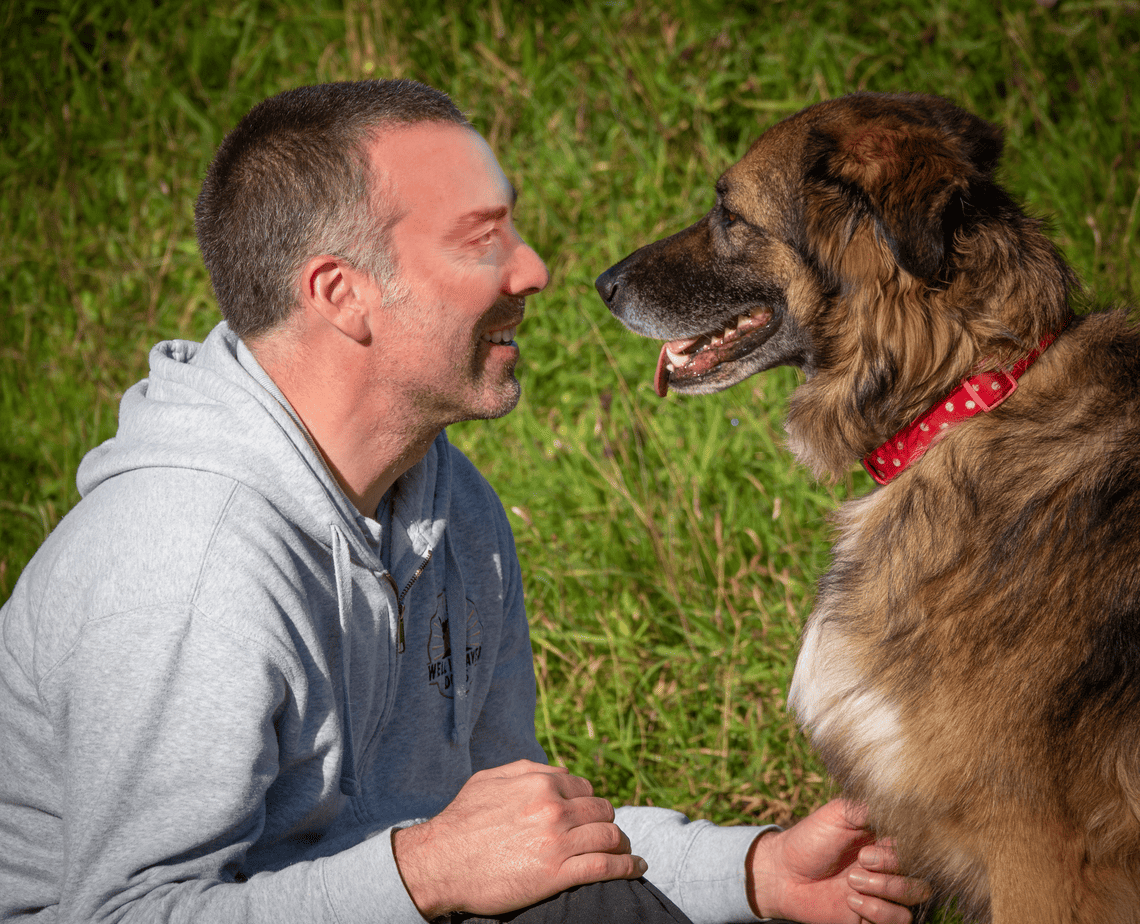Solving Problems For Dog-Owners
Dog Trainer in Tavistock
My name is Nick Battrick, an accredited Dog Trainer and Behaviourist, based near Tavistock, Devon
.
Contact us with an online form
Send Us an e-mail
Frequently Asked Questions

Getting Help With Your Dog’s Behaviour In Tavistock
Do you live in the Tavistock area? If you need help with your dog’s behaviour, then do contact us for a chat to see how we can help. I am an experienced, accredited Dog trainer and behaviourist based near Tavistock. We are in a rural location with plenty of secure space for training dogs, as well as a covered area should the weather be bad.
I can also visit you at your home or at a mutually agreed separate location. We do both one 2 one sessions and also run group classes for like-minded owners (and their dogs!).
I specialise in the following issues – do check out the testimonials section below to see what other clients think.
What’s the Difference between a Behaviourist and a Trainer?
It can be pretty confusing. Some people call themselves a “Dog Behaviourist”, some people call themselves a “Dog Trainer”. For a dog owner looking for help with their dog, what are they to think? Where should they go to get help? These days, a Good Trainer knows a lot about Behaviour, and a Good Behaviourist could have a fair crack at Training if the situation requires it (notice the word “Good” – it’s important!). Here is a (non-dictionary) definition as I see it. A Behaviourist is someone who understands the psychology of dogs; a dog behaviourist is usually employed to stop an unwanted behaviour. A Trainer gets a dog to perform a specific behaviour such as basic obedience – recall, sit, down, leave, all the way up to the very specialist knowledge required to train a Guide Dog or Police Dog.
So there’s overlap between a Dog Trainer and a Dog Behaviourist?
Of course, to train a dog to perform at the top level you’ll need to know something about psychology, or to be effective in stopping an unwanted behaviour you will almost certainly need to know some training methods.
Does It Matter Whar We Call Ourselves?
So, if you want to stop a behaviour, let’s say your dog barks when people walk past the house, understanding why your dog is doing it (behaviourism) might not be very helpful in stopping it from happening. Training an alternative behaviour will ultimately be part of your solution.
Or perhaps you want to train your dog to do something for you, even as simple as basic recall. Although you’ll be training positive behaviours it will really help if you have a good understanding of canine psychology and learning which will get you to where you want to be faster.
That’s why I don’t really think it matters if you call yourself a trainer or a behaviourist. A good dog trainer has a good understanding of behaviour and a good behaviourist will be using plenty of training techniques to achieve their goals. How you brand yourself is not important.
What Type Of Behavioural Issues Does Your Dog Have?
How do you know what sort of help you need with your dog? Ask yourself this question: Do I want to stop my dog from doing something and start my dog doing something? In very broad brush strokes, and using the classical definitions, if you want to stop your dog from doing something you need a behaviourist. If you want your dog to start doing something you need a trainer. The caveat to this, of course, is that if your trainer is good they’ll be good at the behaviour stuff and if they’re a good behaviourist they’ll be able to take on a wide spectrum of training jobs too as long as they aren’t too specialist.
About Well Behaved Dogs
I started out as a behaviourist, that was what I apprenticed to be. Although I started out in this industry studying dog psychology – Why does this dog show this behaviour? – I found that I needed to improve my training ability to be the best I could possibly be at solving a behaviour problem. So now I occupy the middle ground, I do both behaviour and training, or rather I use one to help the other, whatever the job requires.
Once you’ve worked with dogs for a little while you realise it’s a huge subject, the depth and breadth is like no other field I’ve worked in or come across. To be the best you can possibly be you need to keep working on your knowledge. Once I was on my way with the behaviour/psychology knowledge it quickly became apparent that I needed to improve my training ability. One of the things I enjoy the most about this industry is that there is always someone else to learn from. Dogs are such flexible creatures there are many different jobs and roles they fill, and for every job there will be a specialist trainer. There’s a group of working dog people that you should follow to learn how they get a desired response in training for guide dogs, police dogs, search and rescue dogs, whatever it might be. Or there are the dog sports, GRC, PSA, IPO and many more. The approach to take is that everyone knows something valuable and you should learn from everyone. And when you look at the best practitioners of any these disciplines you will realise they are not just using their behavioural knowledge and they are not just using their training skills, they pick and choose from one minute to the next depending on what the dog is doing and what response they want to get from the dog.
How to Get The Help You Need
The moral of this story is, whatever you are looking for help with, training a dog to perform a task or stopping an unwanted behaviour, make sure you read-up on the people you call. What do they specialise in? What is their background? How much experience do they have in the field where your situation lies? These days it doesn’t matter if they call themselves a behaviourist or a trainer, what matters is that they work in the field where you need the help and have the right experience.
Testimonials
You can see more testimonials and leave your own here
Send Message
Contact Us

Nick Battrick
Owner
